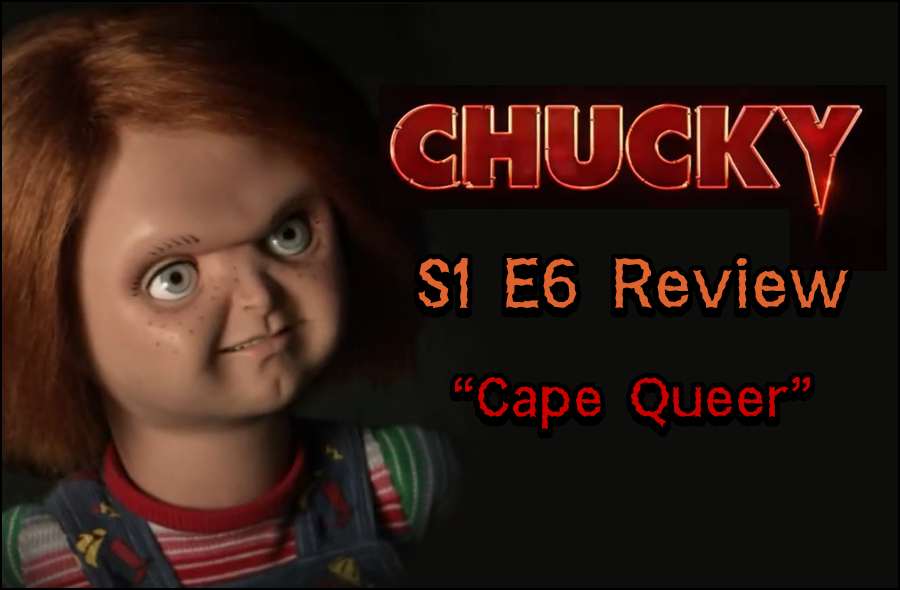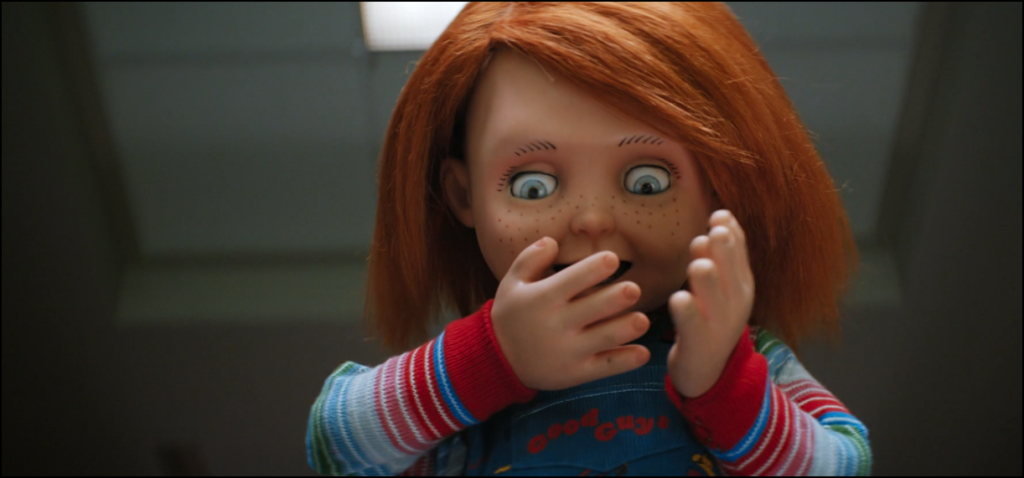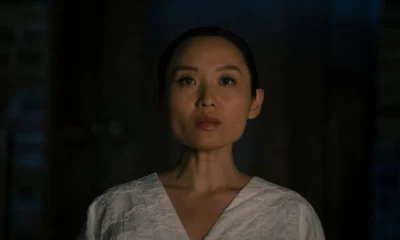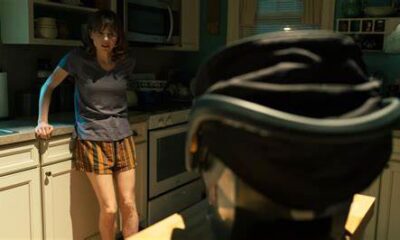
Chucky – S1 E6 – “Cape Queer”
Welcome back to Haunted MTL as we cover Chucky – S1 E6 – “Cape Queer,” the latest episode of the ongoing series featuring America’s favorite killer doll.
This series of reviews will be spoiler-free for the events of each episode but will bring up plot points from previous episodes as needed to contextualize the current week’s events. For a spoiler-centric view, please turn to the podcast Kids’ Stuff for a detailed discussion.
Chucky – S1 E6 – “Cape Queer”
One Chucky takes steps forward and raises his body count while another loses access to his inhabited body. Meanwhile, Jake and Devon get in touch with some iconic survivors of Chucky’s previous murder attempts. Lastly, moms take the center spotlight in this episode and Junior has his worst week ever.
How Was It?
This week’s episode of Chucky, “Cape Queer,” might be the best of the season so far. After an episode that served as a breather and place setter, we see that this sixth episode raises the stakes for the season significantly and introduces some real game-changing moments for the show. This episode also marks the return of series favorite Andy Barclay (Alex Vincent) and Kyle (Christine Elise). But, before we dive into the rest of the review, credit where it is due. Samir Rehem directs an excellent episode full of shocks, clever cinematic parallels, and juggles multiple character arcs. A lot of that credit goes to the writers of this episode, Nick Zeigler and Sarah Acosta, who have the task of arranging the first third of the final arc of the season.

And boy, what an arc this will be. The series opens with a major update on what exactly is going on with Andy and reintroduces Kyle. Much like last week’s episode that reintroduced Tiffany Valentine/Jennifer Tilly (it’s complicated) and Nica Pierce, inhabited by Chucky’s soul, we play catch up with some clips from the films and a quick answer to what happened to Andy after Cult of Chucky. As far as Andy and Kyle go, their introduction is hilarious and terrifying, befitting two traumatized people on a very specific mission. It makes one wonder how far they might go in order to destroy Chucky for good.
Meanwhile, Tiffany reveals she knows more about Nica!Chucky’s current situation than she initially lets on, and we learn what their purpose in Hackensack is. So those pieces are in place and the relationship is much more complicated due to what is becoming an increasingly icky development when issues of consent are invoked. As for our Hackensack locals, Jake (Zackary Arthur) and Devon (Bjorgvin Arnarson) take their relationship forward in a satisfying way while Junior (Teo Briones) and Lexy’s (Alyvia Ayn Lind) relationship becomes strained. And that is before one of the most shocking deaths in the series yet. We even have a strange development regarding Miss Fairchild, the teacher who seems cool… but may harbor a secret.
The episode puts everyone through the wringer and has characters reassess their relationships. Relationships grow and dissolve across the episode, all while the current Chucky ramps up his murder-spree in a brazen way. We are really in the final act of an 8-hour movie now. Maybe the best episode of the season given the amount of character development across the different subplots. There is so much that we could talk about but that would be going into spoiler territory. For now, just know that if you are a fan of the show, this episode is five out of five Cthulhus.
 (5 / 5)
(5 / 5)
Chucky – S1 E6 – Kill Count and Spotlight
Four kills in this one, one in the past with another young Charles Lee Ray sequence (again, played by Fiona Dourif). The other three are contemporary. One is a totally cathartic moment fans will love. The other two, particularly the earlier of the pair, are shocking, sad, and deliciously cruel. One evokes the original Child’s Play and is definitely the highlight of the episode.
Seeds of Chucky
Some elements of this week’s episode are callbacks to previous installments of the series. They may hint at the return of key figures from the past. Some other references to other horror classics may sneak in as well. Here are some of the highlights.
- Apparently the original title for this episode was going to be “Mother’s Day” which might have been too on the nose.
- Speaking of the title, “Cape Queer” is a fun pun that also pays tribute to the homage toward Martin Scorsese’s Cape Fear (1991) that is directly invoked in the plot.
- We get a major callback to Child’s Play with one of the deaths.
- This week’s title card is shattered glass with reflections of Chucky. Make of that what you will.
- We get the origins of Tiffany’s red car. Yes, that is worth noting. It has been with us since Bride of Chucky.
- We learn how Andy got out of his predicament in Cult of Chucky and, well… Andy definitely has some issues.
- Andy’s walk seem a little off? Well, he did get stabbed in Cult. A nice carryover from the film and sets up that we are not that far removed from the 7th film, timeline-wise.
- The poker scene is a reference to Jennifer Tilly’s insane poker skills.
- The realtor we meet is the same woman who got the razor-apple in episode two.
We will be covering the show episode-by-episode on Kids’ Stuff – A Chucky Podcast. However, don’t expect spoilers in these written reviews. You can expect them to fly during the podcast. If you missed the latest show, follow it on Spotify, listen to it on Haunted MTL, or find it on your favorite podcast app.
Movies n TV
Wheel of Time A Question of Crimson Is a Political Espionage Delight
Episode two of Wheel of Time felt like the beginning of a long journey. Stories are unfolding, lives are changing, and blood is spilling.
Let’s discuss.
The story
We begin this episode in the past with Elayne’s mother, Queen Morgase. It turns out her rise to the throne was a bit, shall we say, cutthroat. So when she shows up at the White Tower, Siuan is concerned.
She might have reason to be, too.
Meanwhile, Rand, Egwene, Moiraine, Lan and Aviendha are in the Spine of The World. As they travel through some of the most breathtaking lands I have ever seen on a TV show, Egwene is plagued with nightmares. We think at first that’s just her trauma working itself through her system. But we soon find out that it might not be that straightforward.
Finally, Perrin returns home to heal after his hand is almost cut in half. But when he gets there he finds the town has been infested by Children of The Light. And they’re looking for him.
What worked
There was something heartwarming in this episode about political espionage and choking religious persecution. And that is Elayne’s relationship with her family.
I have consumed a lot of fantasy content with royal families. And I have never once heard a princess call her mother ‘Mum’. I’ve never seen royal siblings get along. And I have sure as hell never seen a princess have a good relationship with her step-parent.
This was refreshing. Even though Queen Morgase is kind of a horrible person she seems like a good mother. And that’s an unexpected delight.

Of course, this is just one storyline among many. And while this can sometimes be overwhelming, in this case it wasn’t.
I’ll be honest, some of these storylines are going to drag for me. I know this because I’ve read some of the Wheel of Time books and I have an idea that not all the characters exactly pique my interest.
No one likes all the characters. No one likes all the storylines. While I am here for the political espionage between Queen Morgase and Siuan, not everyone likes it. While others might be fascinated with Selene trying to win Rand back, I couldn’t care less.
Having multiple storylines keeps everyone’s attention better. So long as things don’t get out of hand. Things can easily get out of hand. But this seems to be managed well.
So far.
What didn’t work
As I mentioned above, I’m not thrilled with Rand’s story at this point. And while it’s fine to not like a storyline when there are this many to choose from, it’s not fantastic that the one I like the least is the one involving our two main characters. And anytime we were with the team at the Spine of The World, the only thing that brought me joy was Moirain’s hat. It reminded me of Stockard Channing’s hat in Practical Magic.
The problem is that Rand is Charlie Brown with controversial magical powers. He is boring, serious, and pessimistic.
And yes, I understand that he has a heavy emotional burden and he’s the Dragon Reborn and that’s quite taxing and all. But let’s be fair, there isn’t a single person in this show that doesn’t have a heavy burden. And most of them manage to be fun occasionally.

All that being said, this episode of Wheel of Time did exactly what it needed to do. It set up conflicts at each of the three locations. It established emotional ties between the characters and the events. And it established goals for everyone.
This was, in short, a solid episode. Not groundbreaking, not mind-blowing or life changing. It was simply good. It was entertaining and moved the plot forward.
Well done.
 (3.5 / 5)
(3.5 / 5)
Movies n TV
Wheel of Time Returns With A Bang
Wheel of Time is back for season three. There are mixed feelings regarding this. Last season, there were some serious pacing issues. And some serious sticking to the book’s storyline issues. But we’re two seasons in, and we don’t give up so easily. So let’s dive into episode one, To Race the Shadow.
By the way, I highly recommend watching this episode with the subtitles on. You’ll see why.
The story
We begin this episode with Liandrin facing a trial of sorts for her rampant betrayal. She does her best to gaslight her Aes Sedai sisters into thinking that Siuan Sanche is the real traitor.

When that doesn’t work, she reveals how many Black Aes Sedai have actually infiltrated the tower.
Spoiler, it’s a lot.
In the aftermath, our whole team gathers to drink and enjoy one night of relaxation before they head out to the Tear to form an army for Rand. All is going well until they’re attacked by myriad creatures and a sentient axe.
What worked
This episode was long. It had a run time of an hour and eleven minutes. And a lot of that run time was spent in heavy dialog scenes.
Fortunately, these were well-done scenes.
If you’re going to have a lot of talking scenes, there are good ways and bad ways to do it. Last season, we saw lots of examples of the bad way to do it. But this episode did it well. For one thing, other things were going on while conversations were taking place. The characters are drinking, playing games, walking through an interesting city. And the scenes themselves didn’t stretch out. They weren’t repetitive. We heard what the character had to say, then we moved on.
It was also nice that the point of these scenes wasn’t just info dumps. We had character development. We had romantic interactions. We had plot development and foreshadowing.
Overall, this episode felt like what it was. A moment of calm before a storm.
Taking a step back, I’d be remiss if I didn’t address the fight scene at the start of the episode. Because it was epic.
The magic looked amazing. The martial arts that went along with it looked fantastic. The costumes were beautiful. It was just incredibly fun to watch.
More than that, it was emotional. We lost some characters in that fight that were important. And it was clearly emotionally shattering for many of our characters, who found themselves betrayed by people they trusted.
So many of them.
It was a great way to open the season.
What didn’t work
Despite that, this episode wasn’t without its flaws.
First off, there were a lot of dialog scenes. And they were good scenes, as I’ve already discussed. But it was one after another after another. And when your episode is, again, an hour and eleven minutes, it’s maybe a little much to have so much chit-chat. Couldn’t some of these conversations, important as they were, have been moved to maybe another episode?
Finally, I want to talk about Egwene’s travel through the arches.

I feel like maybe there were some deleted scenes here. Because there must have been more to that visit than what we saw, right?
We could have seen Egwene battle Rand. That would have been badass and emotionally devastating. We could have seen her with a quiet life with Rand back home at the Two Rivers. We could have seen anything except for the quick clip of Rand in a bloody river, followed by Egwene being shoved back out in a bloody shift.
Bad job. But at least it wasn’t an extended scene of Moiraine collecting bathwater, and then taking a bath while looking sad. If we’d started this season with another scene like that, it might have broken my brain.
Amazon dropped the first three episodes at once. So we’ll be back soon to talk about episode two. See you then.
 (4 / 5)
(4 / 5)
Movies n TV
Entertaining as hell: Eight Legged Freaks (2002) Review
Early 2000s is a special era for the industry. It accepts the cheesiness and corniness of movie making, in turn producing some gems in their own right. Eight Legged Freaks starring David Arquette and young Scarlet Johanson is a horror comedy about giant spiders who overtake a small town. As crazy as that premise sounds, the movie surprisingly has a ton of heart and is super entertaining. Let’s review, shall we?
Plot
We start Eight Legged Freaks with a shot of toxic waste spilling into the water supply of Joshua, a spider farm owner. He is friends with Mike, one of our protagonists, who is a science geek and a spider enthusiast. Mike notices something quite right upon visiting Joshua, but no one takes him seriously. We are then introduced to the rest of the crew. Mike’s mother Samantha, the town sheriff, is too busy chasing Ashley, his sister, who is dating the town mayor’s son Bret (something Samantha does not approve of). We also have Chris, who returns to the town to save his father’s legacy in the town mines. He has opposition from Wade, Bret’s father, who wants to use the mines for his business ventures. Lots of drama going on that will only get juicier once the spiders get loose.
The creepy crawlies quickly dispose of Joshua and make their grand appearance after Ashley rejects Bret’s advances, abandoning him in the middle of a desert. A glorious chase sequence ensues as the spiders make their way towards the town, wreaking havoc on its residents. In a true horror fashion (which the movie acknowledges), it takes some convincing from Mike and then from Samantha for the town to take the threat seriously. The tongue-in-cheek style of narrative adds the comedy aspect to a movie that would otherwise burn out fairly quickly.
The remaining characters hide out in a shopping mall as it’s the only somewhat sturdy building in the area. This doesn’t last long as the spiders break in, forcing them to run through the mines. Their resources to fight the creepy crawlies off are limited as the methane gas doesn’t allow them to use firearms. Such conditions require resourceful thinking from Chris, who uses perfume to fend off the leader of the spider group and save himself during the climax of the movie.
Character dynamics are not forgotten once the action kicks in. We have Chris confessing his long-term feelings for Samantha which she knew all along, which provided some comedic relief. Bret also reunites with Ashley and apologises for being an asshole. Mike finally gets the appreciation he deserves as his knowledge saves the townsfolk more than once during the whole ordeal.
We end the movie with the town’s radio show person telling the story as an urban legend during his segment. This brings it into question – how much of it happened the way he said it did? We can only guess…
Overall thoughts
Eight Legged Freaks is a fun creature feature with some self-aware commentary on genre tropes that doesn’t take itself too seriously. The acting is good, the pacing fitting and the characters are likeable enough for you to want them to make it through. Definitely a must watch, if you don’t suffer from arachnophobia, that is.
 (5 / 5)
(5 / 5)













